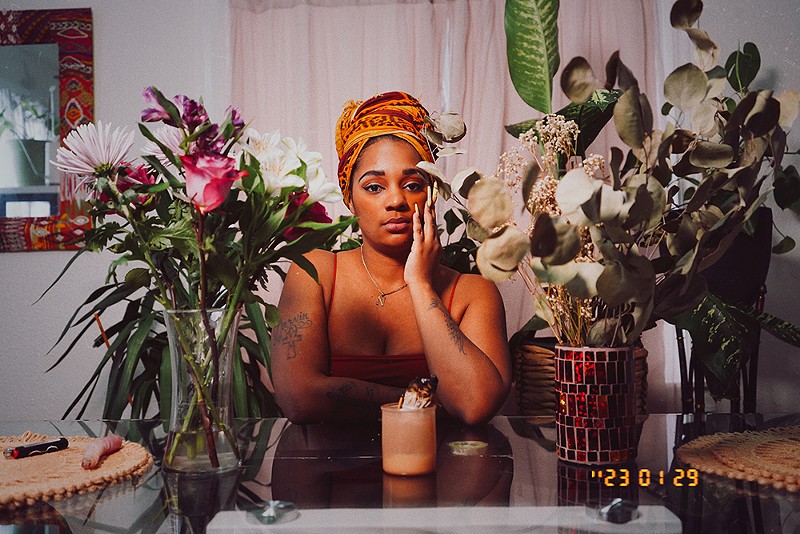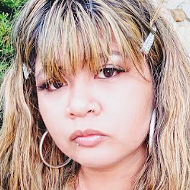
Roughly five years ago, Nkenge Browner got a divorce. The queer, Black woman kept her marriage certificate for many years after. An intriguing thought crept into Browner’s mind: The document was once a powerful memento of love. Then one day, the certificate became just a piece of scrap paper. The meaning had come undone.
“These things, like wedding rings, engagement rings, marriage certificates — they hold so much power in your mind,” Browner says. “And one incident happens in your life. And all of a sudden, they’re just like, in a bag in the back of the closet.”
This Saturday, the immersive, multidisciplinary art exhibition Ephemeral: The Art of Unloving, will open at Swords into Plowshares Peace Center and Gallery in Detroit. Paintings, photography, video, and other tactile, creative mediums will explore the aftermath of divorce and post-romance blues through the work of four queer, Black women artists, including Erika Irie, Alana Gracey, and curators Arrielle Mock and Browner.
Transforming found objects once imbued with romantic meaning into art, Browner says, reinvigorates them with a less powerful grip over the owner and weakens the desire and need to protect these relics. The show centers the experience of Black lesbian love and relationships and provides a space for queer, Black people to navigate heartache in a public way, a catharsis they aren’t often comfortably afforded.
“With so many other divorces of queer people, we don’t discuss them because we spend so much time pandering to hetero-folks and hetero-systems, saying like, ‘Oh, we’re just like you! And we just want marriage like everybody else, and we’ll uphold it. We won’t ruin it. We won’t turn it to shit,’” says Browner, who was a fervent activist for marriage equality.
“We were supposed to represent a whole movement, in our love and in our narratives,” Browner says. In the aftermath of those breakups, there’s often a lack of support groups helping newly single queer people find ways to cope and overcome these losses. “And broken engagements are very common within lesbian communities,” Browner says.
The show’s curators want to uplift the language of breakups among queer people and help them feel less alone. “It’s almost like a collective space for us to grieve together, which in my mind is revolutionary,” says Arrielle Mock, a self-taught photographer, arts educator, and activist who grew up in Detroit. Ephemeral will showcase Mock’s photographs of women holding objects or standing inside spaces which hark back to the memories of past romances. Sometimes, sorrowful ones.
“I feel like in society nowadays, especially with social media, you’re supposed to look happy. You’re supposed to look like life is easy. You’re supposed to look like you have a bunch of money and everything looks great,” Mock says. “So I would like for this space to be a space where people can kind of let that fall away. And just, if they are going through a breakup, if they are going through a divorce, they feel seen. They feel embraced.”
The show also holds meaning in another profound way. Finding spaces that center queer Black women artists is a bit of a rarity even within Detroit’s art gallery scene. “I know, as a Black, queer woman, I’m looking for these spaces actively,” Mock says. Putting Ephemeral together was a collaborative effort driven by the artists themselves. When it comes to creative, Black, queer, women, “you know, it’s a minority within a minority,” Mock says. “Like, there’s just not a lot of spaces. You have to dig really hard to find. So we create these spaces. This was our way of doing that.”
The need for these kinds of showcases is, in some ways, urgent. “So you have, like the larger community of people in Detroit, and then you have the micro community of queer people. And then you start to compartmentalize the micro community, till you get all the way down to Black lesbian folks, right? Then the community gets very, very small,” Browner says. “And we just have less of everything. Less people means less artists. Less artists, less art.”
While organizing the show, Browner did some research and made sure she wasn’t duplicating anybody else’s work. “There’s no show like this,” she says. “There’s no space that specifically targets the same audience that I’m targeting. And I think that anybody can appreciate and learn from this show, but we haven’t seen Black lesbians uplifted in this way before.”
The peace center and gallery is located on East Adams Avenue in downtown Detroit. The space’s namesake, “Swords into Plowshares,” is a Biblical allusion which describes the concept of turning weapons of war into tools of peace. The phrase of pacifism was popularized during the country’s anti-nuclear war movement, says Ian Matchett, the gallery’s director. The peace center and gallery has organized educational events and exhibitions featuring local and national artists. Fighting for labor rights, working class solidarity, and international peace and justice causes is also an integral part of Swords into Plowshares’ history.
When Matchett was hired as the gallery’s director in 2021, he wanted to make sure the space would continue to offer a platform for community members and working-class artists and organizers to engage in culture and social justice causes. “We see our mission as trying to give folks a chance to share, you know, what’s going on in their community, what’s going on in their lives, outside of what is sort of already being shown in gallery spaces,” he says. “And so this show fits right into that, kind of looking at an issue that has been sort of swept under the rug, divorce. Specifically in Black lesbian relationships.”
When divorces were happening, Browner says, many people within the queer community stayed quiet. She believes the silence comes from a protective urge. They don’t want to embarrass queer people or give straight people ammunition to diminish gains made to achieve marriage equality.
In Browner’s view, the act of “unloving” requires a pathway of discipline. Those ties aren’t cut off in one day, and a person must resist calling and depending on their former lover. Those who come to visit the exhibition, Browner says, may interrogate the reasons why they may or may not want to get married, instead of following the traditions of romantic unions set forth by past generations without much reflection.
The desire to uphold a happy front creates pressure for queer people trying to move on from a failed romance. Browner also hopes the exhibition inspires a dialogue for Black queer folks to talk about their setbacks in love. They don’t have to apologize or feel like they let down a movement or no longer deserve their civil right to marry. “So that’s what the path of the show really was. You get divorced and it’s OK to mention it and talk about it,” she says. “It doesn’t have to be a shameful act.”
A free, opening reception for Ephemeral: The Art of Unloving is scheduled from 6 to 9 p.m. on Saturday, Feb. 25 at Swords into Plowshares Peace Center and Gallery. The exhibition runs through March 11.
You can follow Arrielle Mock on Instagram at @deathtomermaids.
Coming soon: Metro Times Daily newsletter. We’ll send you a handful of interesting Detroit stories every morning. Subscribe now to not miss a thing.
Follow us: Google News | NewsBreak | Reddit | Instagram | Facebook | Twitter






